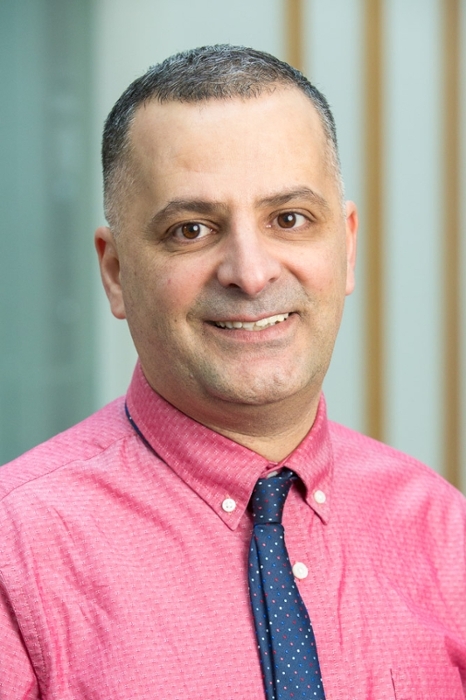Ontario Tech researcher investigating the opportunities and risks associated with drone swarms
Dr. Khalil El-Khatib’s project received support from Canada’s National Cybersecurity Consortium
January 4, 2024

Rapid advances in artificial intelligence and machine autonomy are generating a breadth of opportunities for the deployment of drone-based ‘swarm’ technologies. The operation of drones (sometimes also referred to as unmanned aerial vehicles (UAV)) can be fully or partially autonomous, but are more often they are controlled remotely by a human pilot.
Drones are being utilized for security and surveillance, search and rescue, environmental monitoring and precision agriculture, infrastructure inspection, and package delivery. At the same time, clusters of programmed drones can also be deployed for military purposes, acting collectively as decentralized, but co-ordinated autonomous robots in the battlefield as one single entity. In the military sector, SWARM stands for ‘Smart War-Fighting Array of Reconfigured Modules.’ There is international evidence that drone-based swarm technologies are already profoundly changing the characteristics and tactics of combat.
National Cybersecurity Consortium utilizing Ontario Tech University’s ‘tech with a conscience’ research expertise
Throughout its first 20 years, Ontario Tech University has built a powerful research enterprise centred on ‘tech with a conscience’: challenging the next wave of leaders to cultivate an ethical mindset in their academic pursuits and everyday activities.
Ontario Tech’s Institute for Cybersecurity and Resilient Systems (ICRS) addresses growing cybersecurity concerns and acts to prevent, educate and protect corporations and individuals from cybersecurity risks. ICRS researchers examine issues surrounding the use and protection of emerging technologies such as the Internet of Things (IoT), artificial intelligence (AI), 5G networks, autonomous vehicles, and blockchain in both public and private sectors.
ICRS networking and information technology expert Dr. Khalil El-Khatib of Ontario Tech’s Faculty of Business and Information Technology recently received new research funding from Canada’s National Cybersecurity Consortium (NCC) to investigate a ‘Trustworthy AI-based framework for self-aware drone-based swarm technologies’.
“Due to the nature of communication between drones in a swarm and the unpredictability of the swarm behaviour, the threat landscape poses major risks and unique security issues when compared to a single drone,” says Dr. El-Khatib. “Each entity in a swarm follows a specific algorithm or rule and communicates with other entities to exhibit a complex behaviour to achieve a task. Our objective is to first perform a threat assessment and analysis of drone-based swarms and to then design, develop and test an integrated framework to protect their operations.”
Dr. El-Khatib’s project will collaborate with the Durham Regional Police Service, along with Dr. Elias Abu Hard of Louisiana State University (previously of the University of Texas at San Antonio). The project is one of 20 eligible projects selected for funding under the NCC’s $11.2 million Cybersecurity Innovation Network (CSIN) program, whose goal is to ensure that cybersecurity solutions, products, services, and expertise keeps pace with Canada’s digital transformation.
Media contact
Communications and Marketing
Ontario Tech University
communications@ontariotechu.ca




